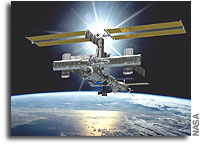NASA Space Station Science Operations Status Report 20 Nov 2003

Science experiments are under way aboard Expedition 8 – the current four-to-six-month mission that began in October on the International Space Station. The new two-man crew aboard the orbiting laboratory is working closely with a new cadre of controllers at NASA’s Space Station Payload Operations Center at the Marshall Center in Huntsville, Ala. — the primary science command post for the Space Station.
Commander Foale, who is also serving as the NASA Space Station Science Officer and Flight Engineer Kaleri will continue to maintain the orbiting research complex over the next six months and will try to do as much science on orbit as time and resources will allow. They are working with a new cadre of controllers at NASA’s Marshall Space Flight Center’s Payload Operations Center in Huntsville , Ala., — the primary science command post for the Space Station.
Currently, equipment is aboard the Station to conduct three new experiments, including some preliminary equipment tests for a follow on of the Synchronized Position Hold Engage and Reorient Experimental Satellites or SPHERES experiment that will allow scientists to study maturing technologies in the flights of self-directed, or autonomous satellites, as well as their rendezvous. Understanding these technologies is critical to the operation of future distributed satellite missions.
Foale and Kaleri also continue to be test subjects in many continuing pre- and post-flight experiments that study changes in the body caused by exposure to the microgravity environment, including a countermeasure that is being tested to prevent the formation of kidney stones. Over the course of this Expedition, they are taking potassium citrate pills or a placebo as part of the Renal Stone experiment. Since potassium citrate may help prevent kidney stone formation, scientists will be able to see how effective it is at preventing kidney stones in space.
Science Officer Foale has already conducted a session with the Italian designed Hand Posture Analyzer experiment or HPA, which researches the way hand and arm muscles are used differently during grasping and reaching tasks in weightlessness and look for changes that might occur during long duration space flight. Foale wears a sensor-equipped glove called a Posture Acquisition Glove to track his hand, wrist and forearm positions. He also measures arm fatigue with gripping and pinching instruments. The measurements will be compared to those taken before and after flight.
During this increment there are 14 experiments from earlier Expeditions remaining aboard the Space Station. These will be utilized if additional supplies that are needed to continue many of them can be brought up on Progress resupply missions. Top priority for Progress payloads will be given to safety and logistics articles that will be needed by the crew. Some others that don’t need resupply or have already been resupplied include the Crew Earth Observations where crewmembers photograph specific targets as the Space Station travels over Earth and Exploration Research or ESTER, another observation experiment which provides mechanical assistance to remove blur caused by the movement of the ISS over the earth as the cameras are focused on particular events such as volcanic eruptions and hurricanes.
Middle schools on the ground are also taking advantage of the cameras onboard the Station with the EarthKAM educational experiment that allows students to pick sites and program the camera to take photographs of those specific sites. Expedition 8’s first session with EarthKAM was a major success with 42 schools from around the world participating — 30 of them brand new to EarthKAM.
During a recent session of the Education Payload Operations, Foale demonstrated one of Newton ‘s Laws that states for every action there is an equal and opposite reaction. His demonstrations were videotaped for later use in classrooms and NASA educational products. EPO is an education payload designed to support the NASA Mission to inspire the next generation of explorers.








